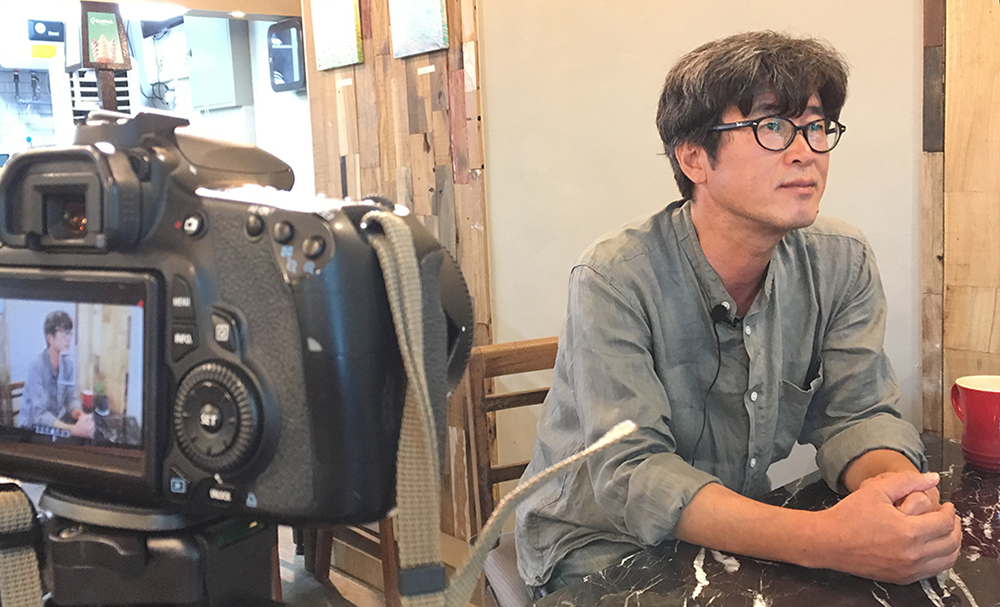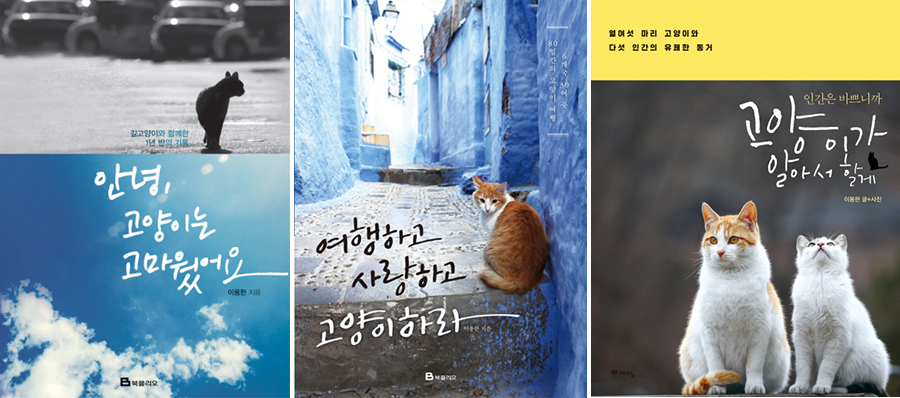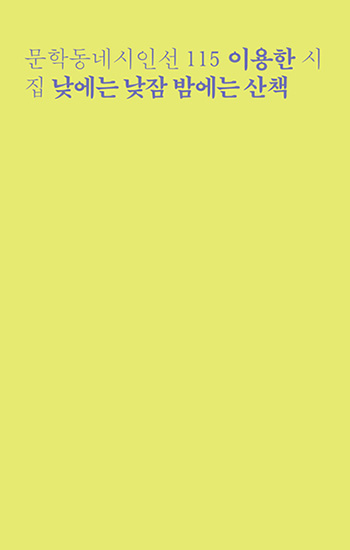|
Author Lee Yong-han A traveler seeking cats amid a sense of loss
2019.08.05
Lee Yong-han is a poet who is comforted by cats and feels happiness through the feline creatures. Starting with his book Hello, The Cat Was Thankful (Bookfolio, 2009) in order to present street cats in a friendly light, Lee has gone on to publish more books about cats he has met during his travels and everyday life, like Be Bright, Cat (Bookfolio, 2011) and Travel, Love and Cat (Bookfolio, 2014). The author's books have gained him the nickname 'cat writer', and Lee says another stage of his career has opened with Humans Are Busy So Leave it to the Cats (Yedam, 2015). The book is about his father in law who ended up living with 16 cats after having disliked them in the past. Lee is also a poet, and his first book was a collection of poetry. However, more readers know of him as the 'cat writer', showing how popular his cat books have been. Lee says he started writing poems because he felt a sense of loss. Then what compelled him to start writing about cats? Lee has penned more than a dozen books on cats, and now his kitty content can be seen in his poetry. The following is his story.
I wanted to show readers that cats are beings that feel emotions just like us,
Everyone calls you the 'cat writer', even yourself. There's no way we can't talk about cats, but it's likely you didn't expect to become popular through cat books when you started writing. How did you start writing books on cats?
Hello, I'm Lee Yong-han. I'm working as a writer of cat books and also as a poet, albeit somewhat lazily. Some time ago, I was also a traveler for roughly a decade, but now my life has very little of that.
Hello, The Cat Was Thankful was exported to Japan, Taiwan and China. What was the response like in those countries?
There is no surefire way to analyze the reader response in countries where my books have been translated aside from sales numbers. In all three countries, the book wasn't published beyond the first edition, so I guess you could say the response wasn't that great. Still, after that first book was published in Taiwan, Travel, Love and Cat and Humans Are Busy So Leave it to the Cats were both released there under the same publisher.
Hello, The Cat Was Thankful, Travel, Love and Cat, Humans Are Busy So Leave it to the Cats
Aside from your nickname 'cat writer' you are also a poet and a traveler. Which title for yourself are you most fond of?
I think apart from whether I'm fond of it or not, I am called a cat writer because I love cats and most of my work involves cats, so people have naturally come to call me that. I have published three poetry collections so far, but I am known as cat writer Lee Yong-han rather than poet Lee Yong-han. I guess perhaps you could say that's unfortunate, but at the same time, I do feel some pressure when people call me a poet. Back when I was traveling, I preferred to be called a traveler. I feel least stressed being called a cat writer, as now I'm usually working on my cat books.
To sum up, I didn't find anything in my travels, and it was all in vain,
You've previously mentioned you stepped into the world of cats after seeing a mother cat sleeping with her five kittens on an abandoned sofa in front of someone's house. Could you tell us about other scenes that compelled you to become a poet and a traveler?
My hometown is now under a lake created by a dam. I still remember seeing my hometown grow far from sight through a cloud of dust as we were moving our entire belongings in a truck as if we were fleeing from something. That sense of loss and loneliness, I believe, pushed me to start writing. I started writing poetry when I was in 8th grade. I think it was rather out of a sense of losing the source of my self rather than losing my hometown. My writing poetry was an inner battle I fought in order to find what I had lost.
Late last year, you published your third poetry collection called Nap at Day, Walk at Night (Munhakdongne, 2018). It took you more than ten years to publish this collection after your last work of poetry. How do you feel?
My third book of poems was delayed because of my laziness and fear. Despite the fact that the publication was delayed, I still feel that it's lacking somewhat. I also feel some self-blame. Writing poetry gets harder and harder, the more you write. I want to write poetry easily but have found that a difficult goal. For some poems, I held onto them for months on end, only to feel they were not a big deal after they had been written. And other times, the flow is broken when I have to finish other books or another project I'm working on. When I go back to finish a particular poem, the emotions I had initially are gone, and at times, I have to admit I ignored my poetry with the excuse that I had to make a living.
Nap at Day, Walk at Night
You mentioned that writing poetry can be difficult. It can be tough reading poetry for readers too! Do you have any tips for readers on how they can read your latest publication better?
While I was working on my latest book of poems, I tried to bring together words that usually don't go well together at all. So, from a reader's point of view, I think I can understand why they might find it hard to comprehend why some particular words were used. Some may feel this strange mismatch may take away from the experience of reading the poems. Rather than taking apart the sentences, putting them back together and delving within the meanings of the words, it's most likely better to just feel the flow of the entire poem like its ambience or the general feeling of things. This way of reading poetry will probably help with other works of poetry and not just mine.
In your latest book, you describe the life of mankind as something very exhausting while drawing out sympathy from others. The lives of cats can be seen in the same light, but in your poetry, they are described in a merrier fashion than the lives of humans. Was that your way of trying to tell human readers that there is something to learn from cats in order to become less tired and happier?
I believe I wrote this once in a book, but I think cats have a particular way of trying their best to live in a carefree manner. Rather than drown in past self-pity and self-blame only to torture themselves, cats are very much in the present. Humans are overly fixated on the past and worry about the future that has yet to come. And we deplete so much emotional energy in our present reality because of these things when we don't have to.
Your latest poetry collection brings together your characteristics as a poet, traveler and cat writer. Mongolia and Tibet are mentioned quite frequently in some of your poems. Are there any travel locations that stand out in your mind?
The country that was most memorable for me and the one that pushed me to think was Tibet. During my stay there, I met a monk who had embarked on a one-year ascetic practice, walking from Yunnan to Lhasa while bowing. I wondered why he was going to these lengths while destroying his body, but he told me that his journey to Lhasa showed his life was being led by his will. Upon hearing those words, I realized so many aspects of my life were being dragged around by numerous things like money, my lifestyle, family and time. I felt I too, wanted to lead my life in a more direct manner. It wasn't that my life was radically changed after this visit, but I now carry that feeling within me all the time, that my life is decided by me and that only I lead it.
Lastly, are there any books by other authors you'd like to introduce to our K-Book Trends readers?
First, I'd like to recommend poet Park Jun's I Ate For Several Days With Your Name (Munhakdongne, 2012). I can't speak for anyone else, but it really spoke to me. I could see glimmers of what I'd lost and the sense of loss that exists inside me through the poems. I think Park is quite good at creating very unfamiliar sentences with very familiar words. Next, I recommend Paper Umbrella's The Happy Stray Cat (Bookfolio, 2010). It's a book that shows cats' actions, expressions and their characteristics overall with photographs that are quite happy and joyful. I dare say readers who can't read Korean will also be able to enjoy it.
Arranged by Choi Hyo-jun
|
Pre Megazine
-

Jakkajungsin Publishing Co.
VOL.69
2024.04 -

Writer Yun Jung-Eun
VOL.69
2024.04 -

Jumping Books Publishing House
VOL.68
2024.03 -

Writer Kim Hwa-Jin
VOL.68
2024.03 -

Publisher Hyohyung
VOL.67
2024.02 -

Writer Minha
VOL.67
2024.02 -

Almond Publishing
VOL.66
2024.01 -

Writer Kwon Jung-Min
VOL.66
2024.01 -

Hakgojae Publishers
VOL.65
2023.12 -

Writer Kim Hye-Jung
VOL.65
2023.12 -

Eidos Publishing House
VOL.64
2023.11 -

Writer Hwang In-Chan
VOL.64
2023.11 -

Munhakdongne
VOL.63
2023.10 -

Writer Chang Kang-myoung
VOL.63
2023.10 -

Happywell Publishing
VOL.62
2023.09 -

Writer Baik Soulinne
VOL.62
2023.09 -

Dasan Contents Group (Dasan Books)
VOL.61
2023.08 -

Writer Lim Kyoung-Sun
VOL.61
2023.08 -

SpringSunshine Publishing Co.
VOL.60
2023.07 -

Writer Lee Kyung-Hye
VOL.60
2023.07 -

Human Cube
VOL.59
2023.06 -

Doctor Jeong Jae-Seung
VOL.59
2023.06 -

Anonbooks
VOL.58
2023.05 -

Writer Son Bo-Mi
VOL.58
2023.05 -

Namhaebomnal
VOL.57
2023.04 -

Writer Kim Bo-Young
VOL.57
2023.04 -

Hugo Publishing
VOL.56
2023.03 -

Writer Cho Kwang-Hee
VOL.56
2023.03 -

Balgeunmirae Publishing Co.
VOL.55
2023.02 -

Writer Lee Byung-Ryul
VOL.55
2023.02 -

Wisdom House, Inc
VOL.54
2023.01 -

Writer Jeong Jia
VOL.54
2023.01 -

Humanitas
VOL.53
2022.12 -

Writer Kim Yeon-Su
VOL.53
2022.12 -

Songsongbooks
VOL.52
2022.11 -

Writer Eun Hee-Kyung
VOL.52
2022.11 -

Bombom Publishing Co.
VOL.51
2022.10 -

Writer Jiwon Yu
VOL.51
2022.10 -

Hangilsa Publishing Co., Ltd.
VOL.50
2022.09 -

Writer Kim Won-Young
VOL.50
2022.09 -

Moksu Publishing Company
VOL.49
2022.08 -

Writer Yoo Sun-Kyong
VOL.49
2022.08 -

Next Wave
VOL.48
2022.07 -

Writer Park Sang-Young
VOL.48
2022.07 -

A Thousand Hopes
VOL.47
2022.06 -

Writer Bora Chung
VOL.47
2022.06 -

Woongjin ThinkBig
VOL.46
2022.05 -

Dr. Oh Eun-Young
VOL.46
2022.05 -

JECHEOLSO Publishing House
VOL.45
2022.04 -

Writer Jang Ryu-Jin
VOL.45
2022.04 -

Changbi Publishers
VOL.44
2022.03 -

Writer Kim Ho-Yeon
VOL.44
2022.03 -

Mati Books
VOL.43
2022.02 -

Writer Lee Kkoch-Nim
VOL.43
2022.02 -

Picturebook Gongjackso
VOL.42
2022.01 -

Writer Kim Sang-Wook
VOL.42
2022.01 -

Writer So-yeon Park
VOL.42
2022.01 -

Writer Yoo Eun sil
VOL.42
2022.01 -

Kungree Press
VOL.41
2021.12 -

Writer Kim Lily
VOL.41
2021.12 -

Writer Park Yeon-jun
VOL.41
2021.12 -

Writer Yi Hyeon
VOL.41
2021.12 -

A deeper world told through picture books 'Iyagikot Publishing (Story Flower)'
VOL.12
2019.06 -

Author Jeon Min-hee
VOL.12
2019.06 -

Illustrator Kim Hwan-Young
VOL.13
2019.07 -

Travelers sailing through the sea of knowledge - 'Across Publishing Group Inc.'
VOL.13
2019.07 -

Genre Novel Publisher 'Arzak Livres'
VOL.14
2019.08 -

Author Lee Yong-han
VOL.14
2019.08 -

Wookwan Sunim
VOL.15
2019.09 -

East-Asia Publishing
VOL.15
2019.09 -

Author Jo Jung-rae
VOL.16
2019.10 -

EunHaeng NaMu Publishing
VOL.16
2019.10 -

Writer Heo Kyo bum
VOL.40
2021.11 -

Writer Kim So-Young
VOL.40
2021.11 -

Author-illustrator Kim Sang Keun
VOL.40
2021.11 -

ACHIMDAL BOOKS
VOL.40
2021.11 -

Author Kang Gyeong-su
VOL.17
2019.11 -

Moonji Publishing Belongs to the Literary Community
VOL.17
2019.11 -

Author Kim Yun-jeong
VOL.18
2019.12 -

I-Seum
VOL.18
2019.12 -

Kim Cho-Yeop
VOL.19
2020.02 -

Creating a window into the future with books
VOL.19
2020.02 -

Author Serang Chung
VOL.20
2020.03 -

Hey Uhm
VOL.20
2020.03 -

Writer Lim Hong-Tek
VOL.21
2020.04 -

BIR
VOL.21
2020.04 -

Writer Song Mikyoung
VOL.39
2021.10 -

Author-illustrator Kim Dong Su
VOL.39
2021.10 -

Writer Lee Seula
VOL.39
2021.10 -

Tabi Books
VOL.39
2021.10 -

Writer Kim Soo-hyun
VOL.38
2021.09 -

Author-illustrator Lee Myoung Ae
VOL.38
2021.09 -

Writer Hwang Sunmi
VOL.38
2021.09 -

Kidari Publishing Co.
VOL.38
2021.09 -

Writer Sohn Won-Pyung
VOL.22
2020.05 -

Woods of Mind's Books
VOL.22
2020.05 -

Writer Heungeul
VOL.23
2020.06 -

Gloyeon
VOL.23
2020.06 -

Maumsanchaek
VOL.24
2020.07 -

Winners of the 2021 Bologna Ragazzi Award
VOL.37
2021.08 -

Picture book artist Lee Suzy
VOL.37
2021.08 -

Author-illustrator Yi Gee Eun
VOL.37
2021.08 -

Hubble
VOL.37
2021.08 -

Writer Baek Se-Hee
VOL.25
2020.08 -

Bearbooks Inc.
VOL.25
2020.08 -

Author Baek Hee-Na
VOL.26
2020.09 -

Yuksabipyoungsa
VOL.26
2020.09 -

Writer Kang Hwa-Gil
VOL.27
2020.10 -

Kinderland (Bandal)
VOL.27
2020.10 -

Writer Ha wann
VOL.36
2021.07 -

Author-illustrator Myung Soojung
VOL.36
2021.07 -

Writer Jung Yeo-Wool
VOL.36
2021.07 -

Publisher EcoLivres
VOL.36
2021.07 -

Writer Lee Geumi
VOL.28
2020.11 -

Sakyejul
VOL.28
2020.11 -

Writer Kim Keum-Hee
VOL.29
2020.12 -

Geulhangari
VOL.29
2020.12 -

Writer Cheon Seon-Ran
VOL.30
2021.01 -

Hyang Publishing House
VOL.30
2021.01 -

Writer Lee Hee-Young
VOL.31
2021.02 -

Sanzini
VOL.31
2021.02 -

Publisher Prunsoop
VOL.32
2021.03 -

Writer Sim Yun-Kyung
VOL.32
2021.03 -

Hanbit Media
VOL.35
2021.06 -

Hyeonamsa
VOL.33
2021.04 -

Author-illustrator Noh Inkyung
VOL.33
2021.04 -

Writer Cho Won-Jae
VOL.35
2021.06 -

Writer Kim Jung-Mi
VOL.34
2021.05 -

Safehouse Inc.
VOL.34
2021.05












